Peter MALONE
Saturday, 18 September 2021 19:51
Child of Divorce
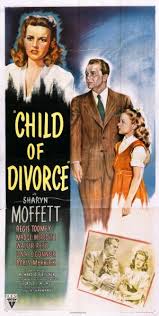
CHILD OF DIVORCE
US, 1946, 62 minutes, Black and white.
Sharyn Moffat, Regis Toomey, Madge Meredith, Walter Reed.
Directed by Richard O.Fleischer.
Child of Divorce is the first film directed by Richard Fleischer, who was to show skills in a wide range of films for 30 years, ranging from 20,000 Leagues Under the Sea, to Compulsion, to Barabbas, to The Jazz Singer.
In the brief running time, and in the style and manner of the 1940s, the film is fairly frank about parents, adultery, divorce, settlement for the child, the effect of all this on the child, the solution of boarding school, and the parents managing their lives as well as trying to relate well to their daughter.
Sharyn Moffat is quite effective as a little girl – a touch precocious. Her career extended from 1944 to 1951.
1. The short supporting feature, human interest story, focus on children, parents, divorce?
2. 1946, the title, the prevalence of divorce at the time, the status, the stigma? Parents falling in and out of love, the consequences for themselves, for their children, multi-parenting? These issues in succeeding decades? In the US? Elsewhere?
3. Black-and-white photography, the lesser-known cast, the director at the beginning of his career?
4. The focus on Bobby, her age, a touch precocious? Love for her mother? Devotion to her father, his absences? At school, with her friends, the discussions about divorce, second fathers et cetera? Seeing her mother with the boyfriend, the kiss, Bobby denying it and angry with her friends?
5. The father, absences, making deals, loving his wife, her feeling abandoned, taking up with another man, planning to leave? How to handle the situation with Bobby?
6. The father’s return, early, the mother surprised, trying to make the phone call? The attempted celebration on his return?
7. Sensing the difficulties, talking plainly, the fight and slaps, the reactions, going to court?
8. The mother with her daughter, the daughter wanting to be with her father, disliking the new father? In the court, the judge and his friendly manner, getting
the information about the quarrel between her parents, the father slapping his wife? The defence counsel? The brutal questioning of the prosecutor? Her
being upset?
9. The decision, the school year with her mother, her politeness towards her stepfather, not liking him? The effect on her? The gift of the dollhouse? Her altered dollhouse and the gift of the piano?
10. Going to see her father, the summer months, meeting Louise, her suspicions? Her being upset with her father?
11. Her parents, the discussion, the advice of sending Bobby to boarding school?
12. At boarding school, her roommate, their discussions, divorce, four parents…?
13. The father’s visit, late, the mother coming to see her, the effect on her, how she would get over it? But the reality of the impact of divorce on children?
Published in Movie Reviews
Published in
Movie Reviews
Tagged under
Saturday, 18 September 2021 19:51
Thief, The/ 1952
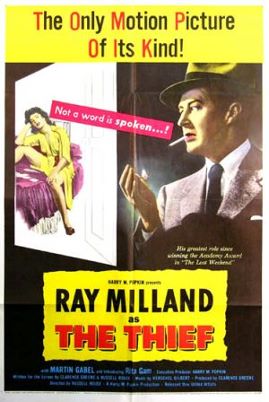
THE THIEF
US, 1952, 86 minutes, Black and white.
Ray Milland, Martin Gabel, Rita Gam.
Directed by Russell Rouse.
The Thief was an experiment in 1952. Only 25 years after The Jazz Singer, here was a film which had no dialogue at all. It did have sound effects, phones ringing, screams… And it had an atmospheric musical score to highlight moods and tensions. However, the film relied on the performance of Ray Milland who communicated his interior states of mind, imagination and fear by his body language and facial expressions. It is a very interesting performance, worth study.
The film was not popular at the box office, too demanding for an audience which had become used to dialogue. The theme was topical for the early 1950s, the anti-Communist feeling, The House of Un- American Activities hearings, the beginning of the Mc Carthy era.
Ray Milland portrays a nuclear scientist who has been honoured for his work. But, without any explanation given, we see that he is being controlled by agents, presumably Russian sympathisers, especially Martin Gabel, and the chain of passing on photographic information. The scientist does his own work, but photographs documents and gives them to the contacts.
The dramatic key to the film is that one in the chain has an accident, his camera is discovered, the FBI come in for investigation, the scientist is followed – as he changes apartments, gets a false passport, is due to ship out to Cairo. There is quite a climax in the Empire State Building, the scientist moving towards the roof, an FBI agent in pursuit.
Of interest, the film introduces Rita Gam. She has quite a small role but a striking visual one.
The film was co-written by producer Clarence Greene and director Russell Rouse.
1. Atmosphere of Atomic Research, Nuclear Espionage in the 1940s and 1950s? Communist Fears?
2. An experimental film, absence of dialogue, focus on action, the sounds, especially the phone? The musical score and its contribution to atmosphere and tension?
3. Ray Milland’s performance, his ability to communicate without words, action and exterior behaviour, the suggestion of the interiors, waiting, listening? His scientific work? The illegal photographs? His body language?
4. The contact, in the street, dropping the paper, the phone calls? The several times that he did this?
5. The process of passing on the photos, the chain of people, their activities? Alan Field and his putting the photos in a safe place, in the library? The various people and their responses?
6. Fields and his worries, more photos, his hiding in the room of the Professor, leaving the camera on the desk? Recovering it?
7. At home, his torment?
8. The accident, the consequences? For Field? For the ring?
9. The FBI, getting the camera, the examination of the photos, the arrest of the wrong scientist? Field watching?
10. Field, the information about the key, going to the station, recovering the case, the clothes?
11. Going to the new apartment, the girl and her sexy look, provocative? His watching?
12. The FBI, following, field avoiding them?
13. The message to go to the Empire State Building? The tourist deck? His being followed, going through the door and up the steps, the dangers, at the top? The agent following, falling, his death? The effect on field?
14. The return to the apartment, the relief, preparing to go to the wharf, changing his clothes?
15. Night, the ship, his watching, thinking, deciding to leave and going to the FBI?
16. How successful a cinema experiment, the relying on the techniques of silent film without captions?
17. The 50s, the Cold War, attitudes towards the Soviet Union? The actual spies from this period and their later being sentenced?
Published in Movie Reviews
Published in
Movie Reviews
Tagged under
Saturday, 18 September 2021 19:51
Expendables 3, The
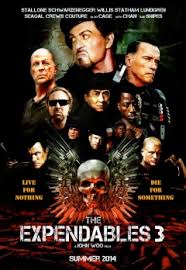
THE EXPENDABLES 3
US, 2014, 120 minutes, Colour.
Sylvester Stallone, Mel Gibson, Jason Statham, Wesley Snipes, Harrison Ford, Kelsey Grammar, Jet Li, Terry Crews, Kellan Lutz.
Directed by Patrick Hughes.
Apparently they are not expendable at all. With the original and now two sequels, they are obviously inexpendable. Although, arch-villain, Mel Gibson, says they should all be ‘deletable’. There is no obvious reason for the expendables not to go on and on – except for most of the casts advancing age!
Within minutes, Sylvester Stallone is leading his squad in an extraordinarily daring raid on a moving train, guns and helicopters blazing against him, to rescue Wesley Snipes (who, in a tongue-in-cheek nonchalant remark when asked about why he was in prison for so long, replies “tax evasion”). And that’s before the credits.
There are several missions throughout the film, all gung-ho, all weapons blazing, though with the contemporary nod to computer skills and hacking for defusing bombs with minimal deadlines, and an extraordinarily high body-count, especially in the final mission which culminates with tank and rocket fire, and an imploding building, from which, of course, the goodies escape, Stallone hanging on to an extension from a flying helicopter. But, of course, it is that kind of film and that is what the fans want (reports of millions of illegal downloads 10 days before the American release of the film).
Words came to mind during the preview: macho, belligerently bellicose, hawkish, invincible American action… But what also came to mind were the May- June 2014 exploits of ISIS in Iraqi, a group going into the city of Mosul, their taking all the money out of the banks, rounding up citizens, bombardments and the execution of Shia military. Real life imitating the movies!
This is a film for a very masculine, macho sensibility – though one of the younger protagonists, the new expendables, is a big strong young woman who works as a bouncer at a fairly difficult club but who joins in the spirit of the expendables, though muttering several times in disgust, “men!”.
Arnold Schwarzenegger turns up as a military contact, along with offsider, Jet Li. Harrison Ford appears as a government suit but finally gets into the action himself, piloting a helicopter and letting fly with weapons.
With apologies to Cormac Murphy, this is definitely a country for old men.
It says something about Hollywood promotion that we know most of these performers just by their personal name: Sly, Arnie, Mel, Harrison, Jet, Kelsey, Wesley… For action fans, Jason Statham is instantly recognisable.
We expect this kind of thing from Sylvester Stallone, Jason Statham, and Wesley Snipes. When Stallone retires his expendables, he accompanies Kelsey Grammar on a search around the United States and Canada and Mexico for replacements. They are good, but do find themselves captured by the villain, Mel Gibson (as villain in last year’s Machete Kills and now as a despicable villain, Hollywood is giving work to Gibson but putting him in roles that elicit no sympathy from audiences).
This means a final mission to a fictitious former Soviet republic to rescue the young expendables.
Interestingly, the film was directed by an Australian, Patrick Hughes, who made a big impression with his contemporary variation on a Western story, Red, Hill. With this showing, and directorial flair, he shouldn’t be out of work for some time.
1. A macho entertainment? Bellicose? The target audience? Expectations of an action film?
2. The background of computer game action? Contrived action? Real action? Raids? The phenomenon of ISIS in 2014 and small squads raiding in Iraq and succeeding? Seemingly preposterous? But credible?
3. The title, the third in the series, the popularity? The cast, the images, age? Types, in action? Values? Standards? The vengeance mentality? Finger on the trigger?
4. The title, the indication of being expendable, especially because of age? The young expendables, knowledge, technology, physical strength, motivations?
5. The stunt work, computergraphics? Chases, explosions?
6. The prologue, going to the rescue of Doc? His being imprisoned for such a long time? The helicopter, the train, the weapons? The crash of the train? The dangerous rescue?
7. Stonebanks as villain, Mel Gibson and his style, arch-villain, a previous Expendable, becoming mercenary, dealing in weapons, the scene of his encounter with the weapons dealer, wanting a nuclear weapon? His links, no scruples? The clash with Barney? The capture of the young expendables and interrogations? Contact in Moscow? In the old Soviet republic? The headquarters? The building, the siege, the rescue, the implosions? Stonebanks being defeated, fighting Barney, his death?
8. Barney and Christmas, their long friendship, the bond, sharing, Christmas and his sardonic remarks, his reaction to Doc? The collaboration of Road Toll, of Gunner and the computer on his wrist? Doc and his being part of the Expendables again?
9. The return home, Barney and his deciding to pension off the old expendables, his manner of telling them, their reaction? His preparation to attack Stonebanks?
10. Drummer, in his suit, government connections, his orders? Trench, Arnold Schwarzenegger’s screen presence? His links? The reappearance of Jet Li? And later, their all going into active service?
11. Bonaparte, his friendship with Barney, the tour around North America, finding new expendables? Going to the mountain, the climber, his freefall, his IT knowledge?the boxer, Hispanic? The girl, the bouncer, her toughness? The action man, not happy with orders? Their qualifying to be the new expendables?
12. Their going to the mission, the capture, Stonebanks and his superiority, his assistance, chaining the young people up, the interrogation? Barney and his escape?
13. The encounter with Galgo, his incessant talking, about himself, his ambitions, pestering people, some ignoring him, some getting a migraine? His later going into action with the best?
14. The plan for the rescue of the young expendables, their still being tied up, time and deadlines, the building and explosives? Tactics? The arrival, the shooting, the strategy, the body count? The timing, Drummer coming with his helicopter?
15. Everybody involved in the tactics in the building, the dangers, each star getting his or her own opportunity to shine? Stonebanks, his dismay, the confrontation with Barney, their fight? The implosion? The link dangling from the helicopter, Barney leaping, the rescue?
16. A film for action sensibilities with a high body count tolerance? The overall effect?
Published in Movie Reviews
Published in
Movie Reviews
Tagged under
Saturday, 18 September 2021 19:51
Snowpiercer
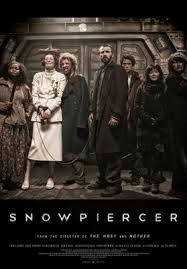
SNOWPIERCER
Korea, 2014, 126 minutes, Colour.
Chris Evans,Tilda Swinton, Jamie Bell, John Hurt, Ed Harris, Kang-ho Song, Octavia Spencer, Ewan Bremner, Ah-sung Ko, Allison Pill.
Directed by Joon-ho Bong.
Snowpiercer is quite striking film, receiving strong critical acclaim.
The actual Snowpiercer of the film is a train with a vast number of carriages, continually travelling around the world, through landscapes, over bridges – but the world has frozen and it is now 2031 and survival is only for those only in the train.
This is really an international film on many fronts, perhaps enabling it to be appreciated in a wide range of countries throughout the world. It is based on a French graphic novel and has been adapted by its Korean director, Joon-ho Bong, whose past films (like Mother, The Host) have, to say the least, many bizarre characteristics, plotlines and characters. And the cast is also international, Americans Chris Evans, as leader of the revolutionaries from the back of the train, and Octavia Spencer as the mother of a little boy who is taken for cruel purposes in the running of the train. Britain is represented by Jamie Bell as the leader’s second in charge, by John Hurt as the guru amongst the revolutionaries and by Tilda Swinton, almost unrecognisable in look and voice as she was in The Grand Budapest Hotel, as the link between the poverty at the back of the train and the wealth and comfort at the head of the train. Ed Harris also appears towards the end of the film. Korea is represented by Kang-ho Song as an expert on opening the doors to successive carriages.
In one sense, the plot is fairly straightforward. Since the beginning of the train’s run fifteen years earlier, there has been a group of poor survivors at the back of the train, crammed into their carriages, clothes deteriorating, and a strange block of food to be cut up, providing minimal protein. There have been some revolutionary uprisings in the past – but, now, it seems is the right time for a new revolutionary movement. Chris Evans as Curtis, who has some dark shadows in his past, is reluctant to be the leader, despite his being encouraged by Gilliam, the guru who has sacrificed one of his arms in the struggle for freedom. Curtis is supported by the wilful and often headstrong Edgar, Jamie Bell.
While the revolution is being prepared, there are visits from the front of the train, a big blonde woman who measures up children and takes away those she has chosen – with a later revelation of the ugly consequences of her action. There is a visit from Mason, the bizarre intermediary between the proletariat in the back and the wealthy in the front.
A lot of the film is taken up with the progress of the revolutionaries, not without some gun battles and a high body count of the soldiers and of the revolutionaries, as they move forward from carriage to carriage, discovering different aspects of the carriages, including a water carriage, an Arboretum carriage, a school for the wealthy, arrogant children, a club car for socialites.
Eventually, there is a climax as they come to the door of the carriage where the owner is ensconced – as we have heard from the beginning of the film. It is in his carriage that there are many revelations about what is happening, about what has happened, and what the future might entail.
The film is intriguing in its plot to say the least and impressive in its unfolding of its story, development of its characters, indication of themes of post-apocalyptic oppression.
Having said that, with the Korean director’s interest in bizarre aspects of plot development, it is important to note that with the many violent sequences, Snowpiercer is not for the faint hearted audience.
1. The acclaim for the film? Korean, French collaboration in the English language? The film based on a French graphic novel? The sensibilities for this kind of action?
2. The graphic novel itself, French, visualised, dramatised, a dystopian world, post-apocalyptic, the new revolution?
3. The director, his work, the touches of the bizarre, Korean background, using his skills and style, yet for an international, English-speaking audience?
4. The international cast – and the irony of their gradual dying off throughout the film?
5. The re-creation of the world, cold world, frozen, the ruins of the cities? The international train, Wilford as the creator of the train? The frozen visuals outside the train, inside the train, the range of carriages and their contents? Musical score?
6. The introduction to the train, focusing on the back carriages, the poverty, the cold, the people crammed in, their old clothes, the protein food, the exchanges amongst the characters? Curtis as leader, his reluctance? Edgar as the second in charge? The role of Gilliam as the guru – and the later revelations about him and his intentions? The role of the soldiers, their brutality, distributing the protein food? The blonde woman coming from the front, measuring people, taking Tim, his mother’s grief, and the later revelation about why he was taken? The years of travel, the previous revolutions, new hopes, waiting for the right moment?
7. The character of Mason, her appearance, manner of speaking, arrival at the back, bureaucratic, acclaiming Wilford, her speech and accent, slang? Her control? Reactions to her presence?
8. Curtis, the story of his past, not wanting to be a leader, the influence of Gilliam and the severing of his arm? The mother, the baby, his violent behaviour? Edgar being the baby, his sense of responsibility for him? Following the example of Gilliam but not wanting to be leader? His interactions with Edgar, controlling him, restraining him? The situation with the taking of Tim? Deaths?
9. The right time, the beginning of the move, strategies and tactics, the violence, the guards, the many deaths, reprisals? Gilliam’s disappearance? Edgar being killed? The later death of Tim’s mother?
10. The visualising of the violence, importance of the revolution, the extent of the body count?
11. The waking of the Korean in his drawer, his daughter? The drug addiction? His need, Curtis supplying? His ability to open doors? His consciousness?
12. The visuals of the variety of carriages and the personnel? The travelling through the train? The visuals outside the train as its many carriages loop back and provide vision of the outside?
13. The water carriage, the visuals, the fish, the storage? The process of purification?
14. The carriage with the food processing, the bones, the ‘Soylent Green’ for the nourishing food?
15. The carriage as the Arboretum, the vegetation, the produce?
16. The school, the wealthy children, spoilt, proper, singing, the role of the teacher, her personality, the refined charm, the vicious comments from the children, the teacher herself and her bursting out with the gun and violence?
17. The capture of Mason, her re-appearance, her being taken hostage, her leading them through the carriages, the tactics, her plea for life, praising Wilford, the suddenness of her death?
18. The loss of power, the darkness, the fights, the leaders and their roles?
19. The carriage with the socialites and their partying?
20. The help of the Korean, the role of his daughter, being rewarded with a drug? Getting to Wilfred, the Korean and his not wanting to open the door, his wanting to escape, belief that the snow was melting, his concern about his daughter?
21. Entering the carriage, meeting Wilford, his manner, his story, his motivations, his financial empire, engineering, the train, its equipment? And his using children in the motor, Tim and his place there? The story about Gilliam and his conspiracy for Curtis to be Wilford’s successor? The invitation to trust? Curtis
and his final steps, rescuing Tim, defying Wilford, Wilford’s death?
22. The rescue, the Korean’s daughter, getting out of the train with Tim, the destruction of the train, the spectacular smash? Out in the snow, the snow melting, future?
23. The effect of this kind of graphic storytelling, with its action plot, its character interactions, its apocalyptic themes, personal self-sacrifice?
Published in Movie Reviews
Published in
Movie Reviews
Tagged under
Saturday, 18 September 2021 19:51
Magic in the Moonlight
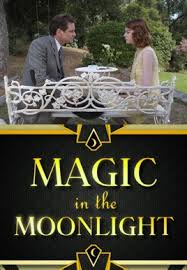
MAGIC IN THE MOONLIGHT
US, 2014, 97 minutes, Colour.
Colin Firth, Emma Stone, Eileen Atkins, Simon Mc Burney, Hamish Linklater, Marcia Gay Harden, Jacki Weaver, Catherine Mc Cormack.
Directed by Woody Allen.
Since 1979, one of the annual events for a film reviewer has been the preview of Woody Allen’s new film, sometimes with two in one year. He has been one of the most prolific American directors as well as having a career in acting. So well-known as a comic, valued for his one-liners, he has also explored the meaning of life, the presence and absence of God, the nature of belief and unbelief, often putting this kind of questioning into the character that he plays.
The 2014 annual event is a quiet pleasure, not a full on comic drama like his previous film, Blue Jasmine, but a pleasant-key, sometimes tongue-in-cheek romantic comedy.
One of the difficulties of Woody Allen being so prolific is that critics and his fans tend to spend a lot of their time making comparisons between his films rather than focusing on the film on view.
This film is very stylish, opening at a theatre with a magic performance in Berlin, 1928, and a brief scene in one of those cabarets with a song by Ute Lemper. But then, it is off to the south of France, lovely countryside, the Mediterranean coast, the mansions of the rich.
The central character, Stanley, played by Colin Firth, world-renowned magician using a Chinese name and Chinese clothes and decor, is tempted by his friend, Howard (Simon Mc Burney), to expose a young woman, Sophie (Emma Stone), who passes herself off as a medium, having vibrations to discern the facts about the past and intimations of the future as well as conducting seances. It is a great challenge. He is an arrogant man with a fair amount of disdain for others, and fancies of his reputation for exposing fakes.
At the house in France is an interesting array of characters. Jacki Weaver (who must be continually offering prayers of thanksgiving for the many international roles she has gained since the award-winning performance in Animal Kingdom) is a widow who owns a mansion, living there with her son Brice (Hamish Linklater) who is in love with the medium. He is a genial enough young man, a touch of the foolish, wooing Sophie, the medium, by playing Jerome Kern songs on his ukelele.
It is Emma Stone’s Sophie who demands audience attention as well as that of Stanley. He is unimpressed by her seance, but puzzles about mysterious aspects and her knowledge of thing she could not possibly know. She is accompanied by her mother (Marcia Gay Harden) who is in the background, planning funding for a foundation for research, but, unfortunately, having very little to do in the action. Much more dominating with her presence is Eileen Atkins as Stanley’s aunt, an amusingly strong performance, especially towards the end when she surreptitiously guides his thinking with what seem to be suggestions but which are designed towards his making a final choice about his life and romance. (Had I been second director, I would have liked Sophie to be sitting in the armchair at the end of the film – you will see what I mean.)
There is something rather strange about having the Woody Allen lines spoken by Colin Firth with his clipped British accent, but many of the lines are those we have heard from Woody Allen himself. Stanley is a rationalist, of the British uptight manner, touches of Noel Coward, but nevertheless he has many Allen lines about the meaning of the world, the meaning of life, the possibilities or not of prayer, the role of God. Some critics and audiences, charmed by the pleasant surface of the film, have decided that there is little depth in it – perhaps they have missed the depth because of the manner of delivery and the Firth tone and voice. (One aspect of the dialogue that should be commented on favourably is that, while Allen has been using a great deal of seemingly unnecessary coarse language over the last 15 or more years, Magic in the Moonlight is refreshingly free of this, no swearing within earshot).
This time the film doesn’t have the wide scope of the excellent Midnight in Paris or the dramatic tension of Blue Jasmine. Nevertheless, it takes its place comfortably in the Woody Allen cannon and provides pleasing enjoyment for fans and audiences.
1. Woody Allen’s career? This film in his late 70s? An entertainment, comic, romantic? Deeper themes about the meaning of life, God, prayer?
2. The title, literal, fake magic, magic performance? Personal magic – and romantic?
3. Berlin, 1928, the shows, the cabaret, the singer? France, the countryside, the roads, the coast, the clips of the water? Homes?
4. The jazz score, the range of songs of the period, Cole Porter: You do Something to Me, Jerome Kern: Who?; Rogers and Hart: Thou Swell? Other songs? The background score?
5. Woody Allen and his strong dialogue, the Noel Coward touches, wit and humour?
6. The introduction to Stanley, the ,magic show, his Chinese disguise, the elephant on stage, the disappearance, the trick with his disappearing and appearing in the lounge chair? His fame? Colin Firth in this role? The arrogant and uptight Englishman?
7. The contrast with Howard, meeting him in Berlin, their past, studying together, comparisons, rivalry? The discussion in the club, Howard’s proposition, testing Stanley, Stanley agreeing? The hints for the later twist?
8. Stanley arriving in France, going to visit his aunt, his relationship with her, her strong character? Her influence on him? Meeting the couple at the house, the hosts? Meeting Brice, Grace? Setting the scene for these characters?
9. Meeting Sophie, her mother? Sophie, her age, charm? Her mother in the background, managing? The talk of vibrations, the information that she had? Stanley and his scorn, his pretending to be a businessman, mocking Sophie about the clouds et cetera? The seance, Grace’s enthusiasm, wanting contact with her husband? The situation of the knocks? The candle rising and Howard taking it? The reassurance for Grace? Stanley and his observations, the effect on him?
10. Keeping Sophie company, their talking, the attraction? Meeting Stanley’s aunt and her knowing something about the affair with the politician, the necklace? The drive, on the road, the breakdown, the rain, in the Observatory, the mystery of life and Sophie’s romantic view? The growing affection between the two?
11. Grace, wealthy, American, with Brice, taken with Sophie, the money for the foundation? Sophie’s mother, in the background, her control?
12. Brice, business, romance, playing the ukelele and singing to Jerome Kern? Proposing to Sophie?
13. The social, dancing, Stanley’s aunt and her presence, vivacity? Her accident?
14. Stanley going to the hospital, his different attitude, the attempt at prayer, awareness of God, meaning of life, change halfway through, his reflections,
sceptical, critical of Sophie? His return? The press conference and his speaking in her favour?
15. The truth, use of fake, Howard and his rivalry and setting the situation up? Wanting forgiveness from Stanley?
16. Stanley, going to his aunt, the devious ways of influencing him by suggestion and question? Stanley and his discovery of something more in life, not just rational explanations, love – and his magic in the moonlight?
17. Speculating, a possible proposal, hearing the knocks, look between the two, the kiss?
18. A film of charm, style, romance, the touch of intrigued with magic, mediums and exposé? An touching on the deeper meanings of life?
Published in Movie Reviews
Published in
Movie Reviews
Tagged under
Saturday, 18 September 2021 19:51
Begin Again
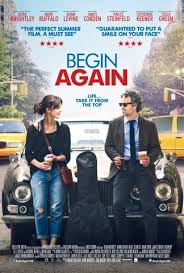
BEGIN AGAIN
US, 2014, 105 minutes, Colour.
Mark Ruffalo, Keira Knightley, Adam Levine, Catherine Keener, Hailee Stansfield, James Corden, Yusin Bey (Mos Def).
Directed by John Carney.
Begin Again is written and directed by John Carney who had a great success with the Irish musical film, Once, which was then transformed into an award-winning Broadway musical.
Carney obviously likes songs, and is interested in those who write them, produce them, distribute them. So, this is a story about singers, musicians, producers and the recording of an album – which means that there are songs inserted every so often during the film, making it a musical but not musical comedy in the traditional sense.
The two stars, Mark Ruffalo and Keira Knightley, work very well together.
We encounter both of them in a bar, he, Dan, drinking, she, Greta, sitting quietly, while her friend Steve (an enthusiastic James Corden) urges her on stage to sing her latest song. Nobody seems to be listening except for Dan who makes her an offer about her lyrics and the possibility of promotion.
Then we go into flashback, Mark’s story, his 18 year marriage to Miriam (Catherine Keener), is trying to be a father to his teenage daughter Violet (Hailee Stansfield), the story of his founding a record company but his seven dry years without inspiration, listening to a string of demo tapes and flinging them out his car window in dismay, offering his opinion to the board meeting only to find that they are dissatisfied with him and oust him. Greta, meanwhile, has been five years in a relationship with a popular singer, Dave (Adam Levine, frontman of the group Maroon 5) who has an affair with his temporary manager, which dismay Greta who is about to return home to London when she is dragged on stage by her friend Steve, to sing her song.
That all sounds rather dismal. But the film is not dismal, audiences finding it rather cheerful, especially when Greta agrees to a recording of her songs for an album, Mark producing, and avoiding all the complications of studios by recording in a range of settings around New York City, in central Park, on a roof below the Empire State, under a tunnel, in a subway… Dan also recruits a range of musicians who have little employment but find it exhilarating to be part of this project. Steve enters wholeheartedly into the project.
There are still some personal complications, Dave not understanding how he could have entered into the affair, but his winning an award, and inviting Greta to come back – she sings a song with hostile lyrics on his phone, which challenges him. Greta also helps Violet, especially with her clothes and shopping, but invites her to play the guitar in one of the recording sessions. And then invites Miriam to be there for the recording.
The film has a nice ending, nothing absolutely conclusive on the personal side but an achievement with the record – and, something which those who download music will appreciate, the distribution of the record online at a lower cost!
Perhaps this film will work if you are in the right mood, but also have a love for popular music.
1. A film for music lovers? The music, the songs, composing them, arranging them, performed, writing the lyrics, recording?
2. New York City, American and English characters? Music in the city, the clubs, the recording company and its officers, theatre, recording sites?
3. The musical score, the songs, this style, the lyrics, arrangements, instruments? There being inserted into the plot line of the film?
4. Dan’s story, his life, 18 years marriage to Miriam, relationship with his daughter, Violet? His founding the company, his enterprise? The lean seven years? Waking up, tired, listending to the demos and tossing them out his car window? His partners, his carefree attitude, discovering their lack of patience with him? His wife’s affair, the divorce and its effect? His wanting to be a good father? Lost in his life, fired, his reaction? Going to the club, drinking, hearing Greta and her song, his response, the talk, she thinking he was coming on to her, whether the issue of being beautiful had anything to do with singing? Giving her his card? The phone call, the meeting, wanting to do something with Greta? His going home, Miriam and her reactions? The bond between them, yet broken? Violet, at school, her father, the meetings, address and his criticism? His idea for the songs, the variety of locations, legal or not? His going to the musician, wealthy, praising Dan for all his help, getting his assistant to write down his rap lines? His wealth, giving Dan the money? Recruiting players, the brother and sister, the teacher with the ballet school, the African- American players, the combination? The participation, rehearsals, getting excited?
5. Greta, her story, British, five years with Dave, the relationship, his songs, her composing, the lyrics? Sharing? His going to Los Angeles, Mim and her being the assistant, the affair with her? Greta’s reaction, leaving? Her friendship with Steve, Steve wanting her to sing in the club, her singing, no one listening, Dan’s response, the talk about performing, her reaction? The meeting with Violet, friendship, the clothes and getting the message across, taking Violet shopping? Meeting Miriam? Dave, his singing, winning an award? Her angry song on his phone? His response? Their talking, his inviting her to the concert? Her going, the way that he sang her song? On the bike, going with Dan to the meeting of the executives, the discussions about royalties? The wanting the song online, at one dollar, sharing the proceeds with the musicians? Dan helping to achieve this?
6. Miriam, her life, the reason for the affair, hurting Dan, his visits to the house, her going to the recording, together at the end?
7. Violet, her age, offhand, clothes, wanting to attract the boy, not listening to her father’s advice, Greta and her advice, shopping? Inviting her to the play the guitar during the recording? Her doing this, sharing work with her father, the achievement?
8. The character of Steve, playing in the club, busking on the street? His becoming involved with the recordings, his enthusiasm, controlling the production?
9. Dave, five years with Greta, the affair, his success, the award, growing his beard, listening to Greta’s song on his phone, contacting her, wanting to get together again, the concert, her comment about how he played a song?
10. The range of musicians, their characters, their enthusiasm in the project?
11. The executives, business, ousting Dan? Welcoming the song, wanting to re-mix? The reaction to the song, the album going online and being sold for a dollar?
12. The director and his love for music and songs, writing, gifts, songs, opportunities?
Published in Movie Reviews
Published in
Movie Reviews
Tagged under
Saturday, 18 September 2021 19:51
These Final Hours
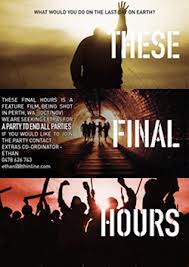
THESE FINAL HOURS
Australia, 2013, 87 minutes, Colour.
Nathan Phillips, Angourie Rice, David Field, Lynette Curran, Sarah Snook, Jessica de Gouw, Daniel Henshall.
Directed by Zak Hilditch.
These Final Hours are, in the film, literally humanity’s final time before the absolute destruction of Earth.
The film works well in the apocalyptic genre, offering a plausible end of the world, a meteor crashing into earth setting off an ever-increasing fireball that destroys the northern hemisphere, Africa and is headed, finally, to Australia. Audiences interested in this kind of film will have in mind the basic core plot of Neville Shute’s On the Beach. There are many differences, this film is more focused on the final hours alone – though it does finish on the beach. Another recent film with this theme is Searching for a Friend at the End of the World with Steve Carrell and Keira Knightley.
The challenge of the film to its audience is to ask what we would do if we had only a few hours to live. The central character, James, played well by Nathan Phillips, is a self-centred man. At the opening, we see him sexually involved with his girlfriend, discovering that she is pregnant, but nevertheless leaving her and going to see another girlfriend at an end-of-life party. He is an Everyman character, but seemingly a less than worthy one. He takes his car, driving to the party, a device which enables the audience to see what is going on in the streets and how people are responding.
One thing that makes an effective impact is that the setting is Perth, ordinary suburban streets, the car passing by very comfortable homes which now are empty, still looking realistic despite what is going on. Most audiences can identify with this setting. The streets are not crowded, though there are bodies lying on the street, one hanging from a light pole, a group of with their Bibles praying in the street, some predators attacking a little girl…
It is this episode the challenges James’s conscience. Reluctantly, yet willingly, he goes to the rescue of the little girl, confronting the brutal predators and killing them. He takes the girl, Rose, who wants to go to find her father. James is still somewhat unwilling but goes to the local ice rink where her father is not to be found, and she asking him then to take her to her aunt’s place where her family were to gather. But, James still wants to go to his party.
The party is a conventional scene of loud music, young people dancing, sexual activity, some of it orgiastic. James leaves Rose with the partyers, and teams up with his other girlfriend, Vicky, who has been looking forward to spend a sexual end of the world with him. He meets up with his friend, Frank, the host of the party who ultimately does not understand James’s altruistic decisions. After disillusioning Vicky that the bunker she and Frank have prepared will not save them from death, she lets him go. In the meantime, there is a woman, mentally deluded by grief and drugs, who thinks that Rose is her daughter and gives her a pill which has a terrible effect on the little girl. This reinforces James and his decision to save Rose.
The final part of the film is, indeed, very sad. Rose finds her family but in tragic circumstances, deciding to stay, that this is the right place for her at the end of the world. James visits his mother, a low-key visit, with a fine cameo performance by Lynette Curran. She is going to stay in her home, quietly doing her puzzles until the end comes.
Which leads James back to where he started, to the girlfriend, seeing the enormous furnace in the sky which is devouring earth, the culmination of these final hours.
Not a film for everyone, rather disturbing in its way. But it is an interesting contribution to the ever-popular apocalyptic imagining of the end of the world.
1. The apocalyptic genre? The end of the earth by fire? Total destruction? The background of such stories as On the Beach? The Australian setting?
2. The initial visuals, the meteor, the crash? The nature of the meteor, its crash to earth, destruction in the northern hemisphere? Moving towards Australia?
3. The Perth settings, the suburbs, the comfortable houses, the streets, the beach? The party? The musical score and its mood?
4. The voice-over, the information, the personal touch in the communication of the radio speaker? James and his response?
5. The film asking the question of the audience what they would do at the end of the world? The visuals of the different reactions in the film, the range of suicides, the hanging in the street, the deaths in the street, James and his sister, her family and the death in the bath, Rose’s family and their deaths in the woods? The violence and brutality, especially towards Rose? Predators on the prowl? The abandoned cars and taxis, the group on the street praying? The absence of people at the ice-skating rink? People staying at home, James’s mother? preparation for death or no preparation, accepting it? Fear? The party, sexual behaviour, orgiastic, be merry for tonight we die, the issue of the bunker and possible safety? The challenge to good order at the end of the world?
6. The opening, James and his girlfriend, the sexual encounter, her pregnancy, his leaving – his thinking of her, discussions with Vicki about her, her being by herself?
7. James’s character, age, experience, his girlfriend, the question of the party, self-centred, wanting to see Vicki, his friend Freddy?
8. The predators with Rose, the challenge to James’s conscience, his going to save her, the brutality, the deaths? His taking Rose in the car? Have the visit of the skating rink, Rose expecting her father, no one there? Going to the library, the policeman father with his wife and children wanting James to kill them? James unable to?
9. Rose, her age, character, wanting to be with her father, wanting to go to the house of Aunt Janice? Her determination? The bond with James? The challenge to his conscience?
10. Going to the party, the visuals of the party, the music, the dancing, sexual encounters? Frank and his abandonment? The woman thinking that Rose was her daughter, Mandy? Rose in the swimming pool? The woman giving Rose the pill? The confrontation with James, shooting her? The orgiastic behaviour? Vicki, her relationship with James, the sexual approach, going to the bunker, his disillusioning her about the possible safety, Frank and the bunker, Vicki and her accepting fate and letting James go?
11. The growing intensity, the voice on the radio, the visuals of abandonment and suicide? Time getting closer?
12. Going to the house Aunt Janice, the search, James finding the bodies in the woods, their deaths? Rose wanting to see her father? To be in the right place? Her strong stance, the decision to stay, James leaving her, looking at her for the longest time possible?
13. James, going to visit his mother, her quiet presence, attitudes towards her son, concern about her daughter and the family? Her decision to stay, doing her puzzles until the end? Urging James to go?
14. The vehicles throughout the film, the vans, the cars, the taxi, the need for petrol? James’s mother giving him the petrol? His driving back home, the car and the exhaust, explosion? His running, his girlfriend at the beach, on the shore, watching the fire coming, her reaction, antagonistic, accepting, the finale with James and the girl waiting for their fate?
15. The film remaining within the apocalyptic genre, avoiding the conventions of the horror film, focusing audience attention on the reality of the end of the world in the challenge as to what one would do?
Published in Movie Reviews
Published in
Movie Reviews
Tagged under
Saturday, 18 September 2021 19:51
House at the End of the Street, The
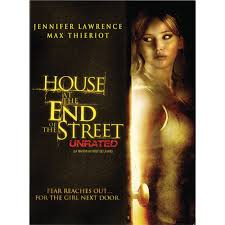
THE HOUSE AT THE AND OF THE STREET
US, 2012, 101 minutes, Colour.
Jennifer Lawrence, Max Thieriot Elizabeth Shue, Gil Bellows.
Directed by Mark Tonderai.
The film made at the time that Jennifer Lawrence was emerging as a strong actress and a substantial screen presence, after her Oscar nomination for Winters, the first film of The Hunger Game series, her winning an Oscar for Silver Linings Playbook – to be followed by an Oscar nomination for American Hustle.
Though the film is slight, a variation on a haunted house story, Jennifer Lawrence as a high school teenager is commanding in the role. Elizabeth Shue plays her mother. And Max Thieriot, fragile-seeming actor, seen in Wes Craven’s My Soul To Take, is ambiguous in the role of a young man whose sister has murdered their parents.
The film has atmosphere – but the most telling aspect is a plot twist in the very last two minutes of the film.
1. The town, ordinary, the park at the end of the house, the house next door, school, hospitals, the countryside? The musical score?
2. The prologue, Carrie Anne and her killing her parents? The visuals? The story about Carrie Anne, about Ryan?
3. Ryan, his going to stay with his aunt, his absence, her death, his coming home? The story of Carrie Anne’s disappearance? The town opinion, antagonism towards Ryan?
4. Elissa and her mother, the divorce, moving house, away from Chicago, the countryside? The attraction of the house? The mother’s parenting, tensions? This settling down, Elissa going to school, the mother going to the hospital, the work, the nightshifts? The setup for the drama?
5. Elissa, age, the move, life in Chicago, the divorce and its effect, playing in the band, singing, liking the house, a curiosity, open-minded, wilful?
6. The mother, the divorce, care for her daughter, work at the hospital, the continuous phone calls, the hopes for a new life?
7. The party next door, the introduction, the sexual advances of the young man, Elissa’s anger, walking home, the rain, Ryan offering her a lift? The mother’s reaction, asking the police for their advice, trust? Inviting Ryan to dinner, pleasant, the confrontation and her demands, his leading? Elissa’s anger? Her mother’s later apology?
8. Ryan, his story, pleasant, at home, the lift, care for Carrie Anne, her being locked in the basement, her escapes and his pursuit? Music, and Elissa’s gift of the tape? Telling the story of the deaths, playing on the swing? The brain damage to Carrie Anne? His parents, their drug-taking? The plausibility of his story?
9. The students smashing Ryan’s car, the fight, his hurting Tyler, going to the hospital? the police, the visitor’s house? Elissa’s mother coming to the house?
10. Elissa, her life in the town, the friend, her brother and the band, singing?
11. Elisa going to Ryan’s house, trapped, the identity of the girl imprisoned, Ryan and is always wanting a Carrie and in the house, relying on her? Chases, her death?
12. The police, the confrontation, death? The mother, her being stabbed? Elisa getting free, getting out, the confrontation?
13. The decision to move away?
14. The plot twist at the end, Ryan and his brain damage, the story of Carrie Ann, his mother wanting him to be a girl, the pressure on him? His being in an institution?
Published in Movie Reviews
Published in
Movie Reviews
Tagged under
Saturday, 18 September 2021 19:51
Men With Guns
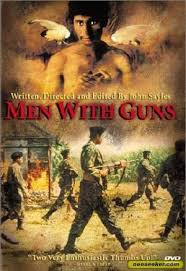
MEN WITH GUNS
US, 1998, 128 minutes, Colour.
Federico Jose Lupi, Damian Alcazar.
Directed by John Sayles.
In a Latin American city, well-respected Doctor Fuentes teaches medical students hoping that they will be of service to the poor. He decides to visit a number of his past students who have gone into the field and into some dangerous areas.
As he starts his journey, with warnings about armed guerillas and the military in the countryside, he discovers that one of his students was burned by men with guns. As he continues his journey with an orphan boy, Conejo, he hears of more deaths of his students, stories of destroyed villages and torture.
A deserter, Domingo, steals his tyres but later returns, wounded, and is cared for by Doctor Fuentes. They are also joined in their journey by a former priest who was ordered to be executed by his villagers. He escapes but the villagers are all massacred.
Finally, the doctor wants to go to the furthest village, hidden high in the mountains, hoping to find at least one of his students surviving. They are joined by a mute girl who has been raped. Dismayed by what he has found and the brutality of military and guerillas, he dies. But a young girl comes for help and Domingo takes the doctor's bag and accompanies her.
This striking movie was written and directed by John Sayles, a movie-maker with conscience. While a writer of clever popular movies for other directors, his own movies are far more serious and thoughtful like City of Hope, Passion Fish, Lone Star, Limbo. Here his approach is almost documentary-like, filming with a Hispanic cast and in Spanish. Mexico is the location.
Sayles is obviously moved by the political troubles that have tormented Latin Americans for decades. He is disturbed by the military clashes and the victimisation of villagers by the men with guns, whether they be military or rebel guerillas. In power struggles, it is the ordinary people who suffer.
In taking the story of a doctor who has stayed in the city teaching medical students over the years while not going out into the field for his own experience or to supervise his students, he highlights the impact of the heroism of those in the field who are willing to and do lose their lives.
He also takes the convention of the journey and an odd collection of characters who attach themselves to the doctor - an orphan, a mute rape victim, a deserter, an anguished priest. And, at the end, he gives his life - but he has empowered the deserter to take on and continue his mission.
1. The impact of the film? Characters? Message? Issues of justice, society? Oppression and violence? Heroism?
2. The work of John Sayles, his personal films, his concerns? His outreach to Hispanic audiences? Realism? Magical realism?
3. The title and its tone? Anonymous men? Oppressors? Availability of guns? Deaths – “because they have them”? The ideologies of men with guns? Ruthlessness?
4. The location photography, the doctor and his home background, the University? His travels, the villages, homes, the poverty? The wide range of landscapes? Mexico? The musical score?
5. The use of language, local languages, English?
6. Dr Fuentes, in himself, his career, a comfortable life, training young people to be doctors? His believing government propaganda? His decision to go to see the doctors, his family trying to persuade him not to go? Mission? His determination?
7. The mission, to see the doctors, the news of death? His wanting to see his students, having sent them out for experience? The bonds with the students? Abilities? Supervision and support? News of the death of the doctors, his determination to go on?
8. The visits, the dangers, the unseen enemy, hostilities, the experiences of people in the villages, of guns and deaths? People responding to him, telling stories, warning him to go? The reports of the situations?
9. His gathering people to go with him: the main encounters of the characters, their stories, Domingo, military, deserter? The young boy, no parents, his wisdom, advice? The young woman, brutalised, mute, raped? Padre Portillo, the former priest, about to be executed, not killed, the villagers killed in his stead, his loss of faith?
10. The purpose of the touristic husband and wife and their appearances, speaking in English, tourists in this land, the ancient sites, the discussions about art culture?
11. The Circle of Heaven, a real place, a mystical place, pure air, no guns, a paradise image?
12. The cumulative effect of the audience accompanied Dr Fuentes and experiencing what he experienced?
Published in Movie Reviews
Published in
Movie Reviews
Tagged under
Saturday, 18 September 2021 19:51
Head in the Clouds
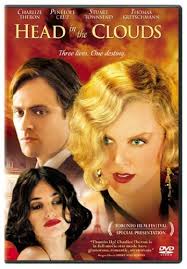
HEAD IN THE CLOUDS
UK, 2004, 132 minutes, Colour.
Charlize Theron, Penelope Cruz, Stuart Townsend, Steven Berkoff.
Directed by John Duigan.
A Head in the Clouds is an ambitious project for English-born but Australian director, John Duigan. Daikon had a successful career in Australia from the 1970s and then some films in the United Kingdom.
This is a story of the Civil War in Spain and World War II. However, a great deal of the early part of the film focuses on two characters, Guy, Stuart Townsend, and Gilda, Charlize Theron. (the couple were partners for many years and this shows in the ease with which they act together.)
Some audiences may find the first part of the film to slow, concentrating as as it does on introducing the two characters, he’s studying at Cambridge and then teaching, she a woman of the world, involved in many affairs, including with the don which is how she makes guy. Eventually, he moves to Paris and shares her life with her then with a Spanish woman, training to be a nurse, Mia, Penelope Cruz. They lead an easy life, Gilda with few responsibilities, and living an easy life, the other two concerned about social and socialist issues and they eventually go to Spain to take part in the Civil War.
The latter part of the film is about the occupation of Paris, Gilda and her relationship with a German officer, Thomas Kretschmann, thought of as a collaborator but, as Guy eventually discovers, part of the resistance.
The film recreates the different worlds shown quite lavishly.
1. A period story, the 1930s, 1940s? The life of the affluent, ease? The contrast with the Civil War in Spain, World War II and occupied France?
2. The title, the truth and the ironies, in relationship to each of the three characters?
3. The events in Cambridge, London, Paris in the 1930s, the affluent world, the film world, fashion and photography? The contrast with Spain at war, harshness, the fighting, the hospitals? Paris during the occupation, the high life for collaborators? The Germans? The resistance and their operations, dangers? Liberation? The musical score?
4. Guy’s story? His British background, studying in Cambridge, an earnest young man, Gilda coming out of the rain, helping her, the beginning of his infatuation? His devotion to her over the years? Events in London, socials, dancing, Gilda leading him on? His life and work as a teacher, relationships, socialist concerns, seeing Gilda in the film, going to Paris, re-connecting? The love, her devotion to him? Meeting Mia, the menage, Guy’s staying in Paris, helping with the photography? His love for Gilda and its effect? His reading the papers, concern about Spain? Sharing Gilda with Mia, Mia and Gilda, their dancing? Unable to tell Gilda about their going to Spain?
5. Guy’s experience in Spain, snow clad mountains, the file of soldiers, shooting, Guy killing someone, finding the locket of his wife and the impact on him? Right into Gilda, getting alliances? Meeting up with Mia, their talking, the bond between the two, their love for Gilda, the news her death, sad? Back to France, the meeting with Gilda?
6. In London, watching the war newsreels, interesting? The impact of Hitler? His credentials were being dropped into France, parachute? Joining the resistance, seeing Gilda with the German, waiting for her, the sexual encounter? The resistance, calling him to account, the threats to him? The resistance, the priest, in the basement? Medical care and the priest? His going back to London, meeting the commander again, being sent back on his own volition? His concern about Gilda, learning that she was part of the resistance? His being too late, the liberation, reading her letter and her declaration of love as well as her work?
7. Gilda, her family, her father, the rich family? The death of her mother? Gilda’s beauty, in England, the liaison with the academic? Seductive manner? Leaving London, appearing in the film, in Paris, her relationships, the photography, the tableau and Mia as part of it? Her love for Mia? Yet detached and not replying to Guido or Mia?
8. The occupation, with the German, fashionable restaurants, the people criticising her, the scenes with the German officer? Seeing Guy, giving him the information? The effect of the resistance? The sabotage on the railways? Guy and his being wounded?
9. Mia, her story, wanting to be a ballerina, her father wanting her to be a gymnast, the injuries, harassment, wanting to be a nurse, leaving her family, going to Paris, the training, friendship and love, the dancing with Gilda? Going to Spain, her commitment, her death?
10. The men in Gilda’s life, the don and his reputation being saved, the entrepreneur, seeing Mia’s wounds - and her behaviour with the entrepreneur, tying him up, beating him, locking him in?
11. The visit to her father, his influence on her? Her not wanting to marry after Guy’s proposal? A mad mother and a harsh father?
12. The experience of the war in Spain, in France? A perspective on society and involvement in the war?
Published in Movie Reviews
Published in
Movie Reviews
Tagged under